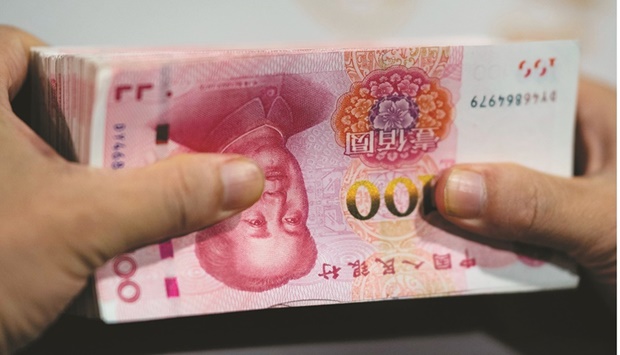China’s credit picked up more than expected in May, although that was largely attributed to a jump in government bond sales and a rise in short-term lending, suggesting borrowing by consumers and businesses remains subdued.
Aggregate financing was 2.79tn yuan ($417bn), the People’s Bank of China said on Friday, up from 910bn in April. Financial institutions offered 1.89tn yuan of new loans in the month, but more than 60% of those loans were short-term, indicating that companies and households are still reluctant to boost borrowing to buy houses or invest.
Economic activities continued to struggle in May, though the easing of Covid lockdowns in some regions meant that the degree of contraction lessened. While the worst of the current economic fallout may be coming to an end and the central bank is urging banks to “go all out” to boost lending, there’s little sign in Friday’s data of a strong rebound in demand for money which would propel growth in coming months.
Real credit demand didn’t recover much once you exclude short-term lending, according to Jacqueline Rong, deputy chief economist for China at BNP Paribas SA. “Mortgages still haven’t recovered, as high-frequency data such as property sales were not much better than in April,” she said.
“Household consumption may have recovered a little from April but not much. Corporate investment in fixed assets, as reflected by medium- to long-term corporate loans, was not too strong either.”
While banks made 1.53tn yuan of loans to the corporate sector, there was a record 712.9bn yuan in very short-term bill financing and another 264.2bn yuan in short-term lending. About 555bn yuan was in medium- to long-term loans to companies.
Household loans came in at 288.8bn yuan in May, less than half the level of a year earlier. Almost 105bn yuan of that was medium to long-term loans, which are a proxy for home mortgages, while the other 184 billion yuan was in short-term loans.
The growth in the stock of loans was 10.9% in May, slightly higher than the level in April, which had been the slowest since at least 2003. There was 1.06tn yuan in government bonds sold in the month, while corporate bond issuance shrank almost 11bn yuan.
Coming on top of the yearlong housing market downturn, the uncertainty about the immediate future looks to be a factor in the continued reluctance of companies and households to take out loans. As a result, banks are flush with cash and this has spread into the interbank market. Lenders struggling to find enough people to borrow money were swapping bills with each other in May just to meet regulatory requirements for corporate lending.
The government and central bank are both trying to help the economy recover from the problems in April and May caused by lockdowns in Jilin and Shanghai and Covid restrictions elsewhere. In addition to the verbal guidance from the PBoC to raise lending, banks cut interest rates for their best customers late in the month in an attempt to boost mortgage demand. Policy banks were ordered last week to provide 800bn yuan in funding to infrastructure projects.
“In the next three to six months, the government has no choice but to push banks to extend credit to the real economy,” as companies remain starved of cash, said Larry Hu, head of China economics at Macquarie Securities. “We will see pretty strong credit data in the next few months due to the government’s strong incentive to push lending.”
However, with the government sticking to its Covid Zero policy, the success of those efforts partly depends on whether the government can actually control the much more transmissible omicron variant. If Shanghai or other major cities were to go back into lockdown it would again interrupt production, consumption, logistics, and travel, dealing a serious blow to any recovery.

An employee is counting out 100 yuan notes at a bank in Shanghai. Financial institutions offered 1.89tn yuan of new loans in the month, but more than 60% of those loans were short-term, indicating that companies and households are still reluctant to boost borrowing to buy houses or invest.
